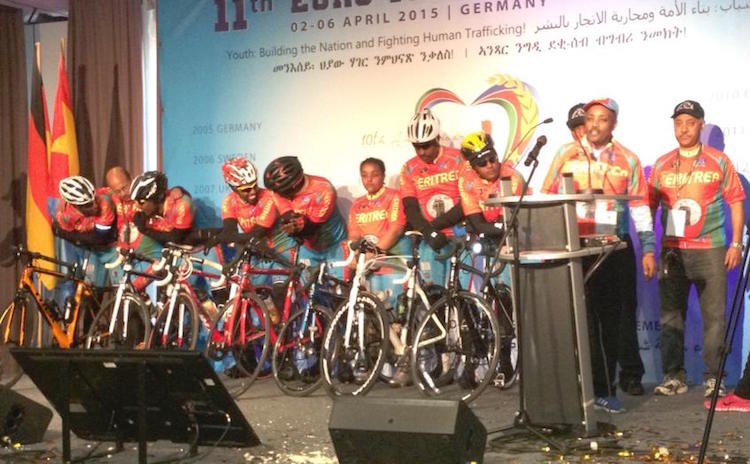Analysis by Martin Plaut *
BRUSSELS (IDN) – “I have never experienced anything like it,” says Philippe Remarque, editor in chief of De Volkskrant. The paper – the Netherlands’ largest broadsheet – has been taken to court by a man Remarque describes as an “operative working for the benefit of the awful Eritrean dictatorship”. On May 13 the newspaper received a verdict in the second case in which the court ruled once more in favour of the newspaper.
There is a large, and growing, Eritrean community in the Netherlands. Eritreans flee their country at a rate of 5,000 a month – the largest number of refugees crossing from Libya to Italy. More than 38,000 made the dangerous voyage in 2015, according to the European border agency, Frontex.
Those who arrive in the Netherlands seek refugee status. They discuss their cases with the Dutch immigration agency, only to confront a problem. According to a Dutch based website, Oneworld, refugees found that they were speaking through official translators who had close links with the Eritrean government.
This allegation was published in Oneworld last year. The article quoted a leading scholar on the Horn of Africa, Professor Mirjam van Reisen, who said: “The interpreters are linked to the centre of [Eritrean] intelligence in the Netherlands and in Europe.”
Professor van Reisen was sued by Meseret Bahlbi, the chairman of the youth wing of Eritrea’s only legal party – the PFDJ. His brother and sister had been acting as translators. When their family’s relationship with the Eritrean state became known, the work was withdrawn, since Dutch regulations demand that translators are strictly neutral.
De Volksrant took up the story in early 2016 and was promptly sued by Meseret. He demanded €50,000 damages – of which €15,000 to be paid immediately – and a correction on De Volkskrant’s front page. The paper refused to comply and the matter went to court.
Threatening freedom of expression
Eight court cases were opened by the Eritrean and his supporters. These included actions against Professor van Reisen, a radio station and the Dutch immigration service. Oneworld received a writ, but so far no further legal action has been taken.
ARTICLE 19 – the international organisation defending freedom of expression – told the New Statesman it is worried by the development.
“These vexatious civil defamation lawsuits in the Netherlands’ courts are an attempt to silence criticism and debate, to prevent journalists and academics from revealing the truth, and to intimidate the Eritrean diaspora,” said Thomas Hughes, executive director of ARTICLE 19. “This is a violation of the right to freedom of expression – which defends critical and investigative journalism that is in the public interest, as well as academic freedom.”
All the cases on which judgement has so far been delivered have failed, with the Dutch courts comprehensively rejecting the allegations. This has not halted the tide of legal action. Professor van Reisen faces an appeal against the judgement in her favour.
This is not some random act of a frustrated member of the Eritrean diaspora, but a well-planned state strategy.
Eritrean government’s hand
Philippe Remarque says there are clear links between Meseret Bhalbi and the Eritrean regime. “Our lawyers proved that connection in great detail.”
The Eritrean government has orchestrated the international campaign to silence its critics.
Last year Yemane Gebreab, President Isaias’s closest adviser, told 550 young Eritreans attending the party’s youth rally in Germany that fighting the country’s ‘enemies’ was their top priority.
“We have to remember, always remember, that we have still enemies who plot on a daily basis,” Yemane told the conference.
“Enemies who don’t tire and don’t sleep, who try to bring our downfall … Therefore, our first objective… the objective which still remains at the very top of the list, is to conclusively defeat this hostility hovering over of our nation. That remains the job.”
Despite the court defeats, pro-government Eritrean websites continue to celebrate the legal action. “Your academic licensee does not give you a green light and you can flaunt the ruling as a victory but it is very far from the truth and you know it,” declared one site.
While Meseret Bhalbi receives legal aid from the Dutch government to bring the cases to court, the defendants do not.
The aim appears to be to use the legal system to drain the resolve and the funds of those they are attacking. By taking up the time and the financial resources of their critics, the Eritreans are attempting to dissuade Dutch newspapers, media outlets and academics from undertaking further investigations into the Eritrean government’s activities against the growing exile community.
* Martin Plaut is a journalist specialising in the Horn of Africa and Southern Africa. [IDN-InDepthNews – 16 May 2016]
IDN is the flagship of International Press Syndicate.
Photo: Participants in the ‘Cycling Tour for Truth, Peace, Justice and Eritrea’ at the 11th Annual Euro-YPFDJ Conference In Germany in April 2015 | Credit: eritrean-smart.org
IDN-InDepthNews | Analysis That Matters
Send your comment | Subscribe to IDN newsletter
Follow us on Twitter and Facebook:
http://twitter.com/InDepthNews
http://www.facebook.com/IDN.GoingDeeper

